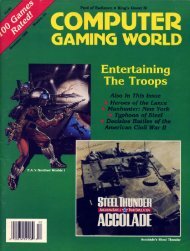Why Game? 1 - TextFiles.com
Why Game? 1 - TextFiles.com
Why Game? 1 - TextFiles.com
You also want an ePaper? Increase the reach of your titles
YUMPU automatically turns print PDFs into web optimized ePapers that Google loves.
ourselves.”<br />
When games left the arcades and went<br />
home, is it possible that something was lost?<br />
What was once a public experience had now<br />
be<strong>com</strong>e private. The high score tables in your<br />
shooting games contain your own initials, over<br />
and over, along with maybe those of a handful of<br />
people you’ve leant your copy to. A game is<br />
played alone, not surrounded by people<br />
watching intently, whom you will watch in turn.<br />
Alone, there is no one to show your skills to;<br />
there is no one more skilled to demonstrate how<br />
to <strong>com</strong>plete the parts you find difficult. There’s<br />
no thrill of showing a novice something they<br />
have never seen before.<br />
In this way, super play movies might fill a<br />
necessary role that has been abdicated, creating<br />
a <strong>com</strong>munity where there no longer might be<br />
one. That doesn’t explain, however, the<br />
proliferation of so many movies that are not<br />
super plays. Role playing games. On the Speed<br />
Demo Archive message boards, posters ask if<br />
anyone’s interested in seeing a speed run of<br />
Shenmue. The Internet Archive hosts a video of<br />
someone sailing around a lighthouse in Second<br />
Life, and a number of videos of events in World<br />
of Warcraft set to music. <strong>Why</strong>?<br />
I think it has something to do with what<br />
Will Wright called “owning your experience” in<br />
his GDC Spore demonstration. During his talk,<br />
he mentioned Grand Theft Auto. What had<br />
be<strong>com</strong>e important to him while playing the<br />
game was not the missions and cut-scenes that<br />
the game’s developers had designed for the<br />
player to plod through, but the individual stories<br />
that emerged from the unique experiences<br />
Wright encountered as he explored the game’s<br />
world, mechanics and limitations.<br />
Videogames, as media, are different from<br />
novels and films in that each player will have a<br />
very different experience when playing a game.<br />
Narratives emerge which are unique to one<br />
player’s experience; events may unfold in a<br />
<strong>com</strong>pletely different order for another player. I<br />
record demo play movies of games I like, games<br />
which I think are obscure enough that not many<br />
players have encountered, and enjoyable<br />
enough that more players should. In those<br />
movies I play in such a way as to make the rules<br />
of game obvious and understandable to a person<br />
who is seeing them for the first time. The movie<br />
contains a narrative that the player watches<br />
and, hopefully, in watching, learns from. That<br />
narrative exists in that movie only; it can never<br />
be recreated exactly. Is it the recording that’s<br />
important?<br />
I would argue that it’s the <strong>com</strong>munication.<br />
Gaming is an experience that, like any other,<br />
needs to be shared (and frequently, at least for<br />
me, needs to be shared to be validated). What’s<br />
being shared is something very intimate: the<br />
player, even more than the game. It’s a<br />
transcription of the player’s nuances, choices,<br />
decisions, what is important and what is<br />
interesting. It is not the kind of thing that can<br />
be shared in a block of prose on a message<br />
board. This is, I think, why video recording is<br />
and will continue to be necessary.<br />
At least until we’re all gathered around the<br />
arcade machine again.<br />
Speed Runs and You 45

















